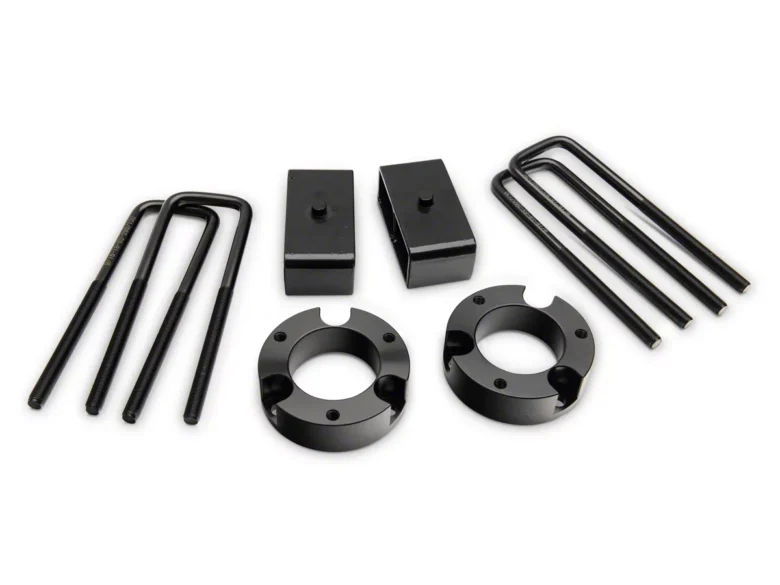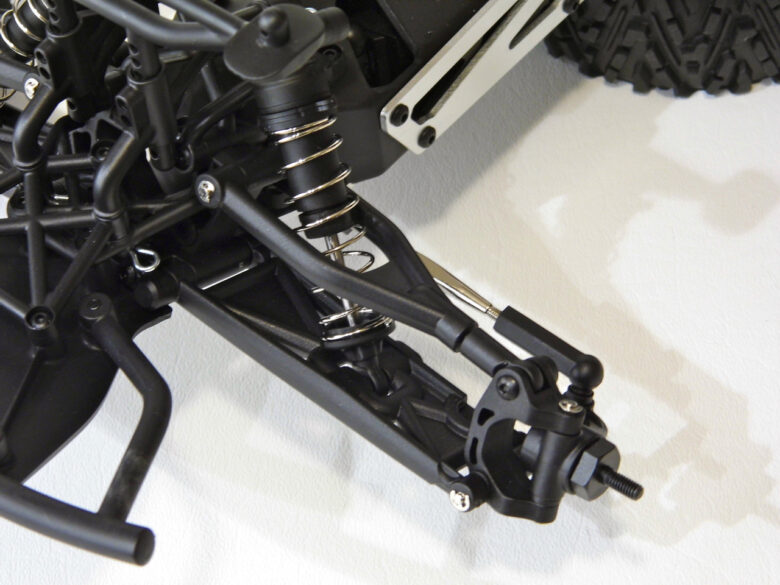If you’re the proud owner of a truck or SUV, you may have heard about leveling kits. They are a popular aftermarket upgrade that can help level out your vehicle’s stance, improving its appearance and performance. Go with KSP leveling kits now. In this article, we’ll dive into what truck leveling are, why you might need one, what to consider before purchasing and some suggestions to install them.
Contents
What is a leveling kit?
A leveling kit is an aftermarket suspension upgrade that helps raise the front or/and rear of a truck or SUV to get a level stance. This is often necessary because many factory trucks come with a “rake,” meaning the rear end sits higher than the front. While this may improve towing and hauling capabilities, it also hinders off-roading or aesthetic purposes. It typically consists of spacers or new springs installed on the front suspension to raise it to a level position.

Source: extremeterrain.com
Why might you need a leveling kit?
Consider installing a leveling kit on your vehicle for several reasons. Here are a few:
Improved appearance: A level stance can greatly enhance the look of your vehicle, giving it a more aggressive and sporty appearance.
Off-road capabilities: A level stance can also help with off-roading, providing better ground clearance and approach angles.
Handling: Leveling out your vehicle can improve handling and stability, particularly if you’ve added a heavy bumper, winch, or other accessories to the front end.
Towing and hauling: If you frequently tow or haul heavy loads, it can help prevent sagging in the rear and improve weight distribution.
Do level a vehicle cause problems?
Level a vehicle can cause problems if installed incorrectly or used improperly. Here are some of the common issues that can arise from leveling kits:
Suspension and steering issues: Leveling a vehicle can alter the vehicle’s suspension and steering geometry, resulting in poor ride quality, reduced handling, and accelerated wear on suspension and steering components. These issues can be more significant if it needs to be installed correctly or if it is used in conjunction with larger, heavier wheels and tires.
Alignment problems: When the front suspension is adjusted to level the truck, it can change the vehicle’s alignment, result in uneven tire wear and influence handling. It is important to have an alignment and adjusted after installing it.
Clearance issues: Leveling a car can cause problems with certain components, such as brake lines, steering linkage, and other undercarriage parts. This can lead to damage if these components come into contact with other parts or are improperly secured.
Warranty concerns: Installing it can void the vehicle’s warranty, as it may be considered a modification that affects the vehicle’s performance and safety.
It is important to note that these issues are not inherent to all leveling kits. Many problems can be avoided by choosing a high-quality kit, having it installed by a professional, and using it properly. Regular maintenance and inspections could help identify issues early on, allowing them to be addressed before they become more significant problems.

Source: blenderartists.org
What to consider before purchasing a leveling kit:
Before you go out and purchase it, there are a few things you’ll want to consider:
Your vehicle’s suspension: Not all leveling kits are created equal, and some may work better with certain breaks. Be sure to research which equipment is best suited for your vehicle.
The purpose of your car: Consider how you use your truck or SUV. If you frequently tow or haul, you’ll want to ensure your chosen it can handle the added weight.
Your budget: They can range in price, so choose one that fits your budget.
Installation: Depending on your preferred one, installation may require professional help—factor in the installation cost before purchasing.
Can I install a leveling kit myself?
Installing it on your vehicle can be straightforward if you have experience working on cars and trucks. However, it is vital to note that it is not a job for beginners, and it may require special tools or equipment you may need.
Before you start the installation process, read the instructions thoroughly. These instructions will give you a good idea of what is involved in the installation process and what tools and equipment you will need.
You will need to understand how your vehicle’s suspension system works and how to properly jack up and support your vehicle before attempting to install a leveling kit. You should also be comfortable working with power tools and having a good understanding of basic mechanical principles.
Suppose you are not comfortable installing by yourself. In that case, it is always best to seek the help of a professional mechanic or specialized truck shop to install the auto part for you. Improper installation can damage your vehicle or even safety hazards, so it’s important to ensure it’s done right.
What is the average cost of installing a leveling kit?
The cost to install the auto parts on a vehicle can vary depending on several factors, such as the make and model of the car, the type of leveling kit being installed, the shop or mechanic performing the installation, and the location of the shop.
On average, installing it can range from $200 to $800 or more. The cost can be on the lower end of this range if you install the equipment yourself, but if you choose to have it professionally installed, the price will likely be higher due to labor costs. Some specialized truck shops may charge more than general auto repair shops due to their expertise.
It’s important to note that the cost of the leveling kit itself is usually not included in the installation cost. Its prices can range from around $50 to over $500, depending on the type and quality of the part.
Overall, the cost may vary widely depending on several facotrs, so it’s best to research and get several quotes before deciding. It’s also important to choose a reputable shop or mechanic to ensure the installation is done correctly and safely.
Conclusion
In conclusion, leveling kits can be a great way to improve your truck’s or SUV’s appearance and performance. With a little research and careful consideration, you can find the perfect kit for your needs and budget.
